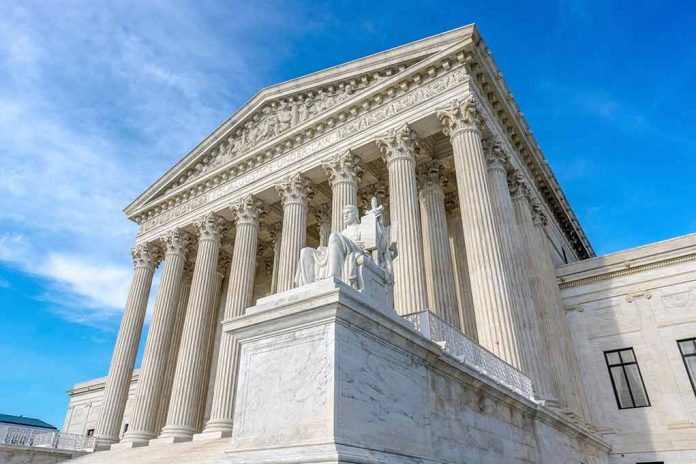
The U.S. Supreme Court heard arguments on Tennessee’s ban on gender-affirming care for minors and is weighing in on a decision, sparking a nationwide debate on civil rights and medical ethics.
At a Glance
- Tennessee’s 2023 law bans puberty blockers, cross-sex hormones, and surgeries for minors
- The state argues the law protects children from “irreversible, unproven medical procedures”
- Plaintiffs claim the ban violates constitutional rights and equal protection
- The case’s outcome could impact similar laws in over 20 other states
- Public opinion largely opposes these medical interventions for minors
Tennessee Defends Ban on Gender-Affirming Care
Tennessee’s Attorney General Jonathan Skrmetti took a stand before the U.S. Supreme Court, defending the state’s 2023 law that prohibits gender-affirming care for minors. The law, which bans puberty blockers, cross-sex hormones, and surgeries for children, has ignited a firestorm of controversy and legal challenges.
Skrmetti argued that the law is a necessary measure to safeguard children from potentially harmful and irreversible medical procedures. The state’s position is that it has the authority to regulate medical practices, especially when it comes to social issues that directly impact the well-being of minors.
The Supreme Court hears oral arguments Wednesday in a dispute over a Tennessee ban on certain medical treatments for transgender children. https://t.co/eFKTP4T3Mv
— Roll Call (@rollcall) December 3, 2024
Constitutional Challenges and Civil Rights Concerns
On the other side of the courtroom, plaintiffs, including families of transgender children and civil rights organizations, assert that the law infringes on constitutional rights. The American Civil Liberties Union (ACLU) and other legal groups representing the plaintiffs argue that the ban amounts to sex-based discrimination, violating the Constitution’s equal protection clause.
“We are simply asking the Supreme Court to recognize that when a law treats people differently based on their sex, the same equal protection principles apply regardless of whether the group impacted by the law happens to be transgender.” stated ACLU attorney Chase Strangio.
The federal government has thrown its support behind the plaintiffs, opposing Tennessee’s law. This aligns with the Biden administration’s stance that preventing minors from accessing transgender treatments constitutes sex discrimination.
Medical Community Divided
The medical community remains split on the use of gender-transition treatments for minors. Supporters of the ban point to the lack of long-term studies and potential irreversible consequences of these interventions. Critics of gender-affirming care for minors highlight the risks associated with puberty blockers and cross-sex hormones.
Concerns have been raised about the influence of pharmaceutical companies and wealthy backers in promoting transgender treatments. Some medical professionals argue that these interventions are being pushed without sufficient evidence of their long-term safety and efficacy with focus only on what amount of profit can be made.
Public Opinion and International Precedents
Public sentiment appears to lean against medical interventions for transgender minors. Recent polling suggests that a significant majority of Americans, approximately 72%, oppose these treatments for children. This aligns with policy shifts in several European countries, which have become more restrictive in their approach to gender-affirming care for youth.
As the Supreme Court concludes its oral arguments, which was livestreamed on its webpage, the nation watches closely. The decision will not only impact Tennessee but could set a precedent for over 20 other states with similar laws, potentially reshaping the landscape of transgender healthcare for minors across the country.
Sources:
Tennessee’s gender affirming care ban for children goes to U.S. Supreme Court for arguments
Supreme Court Reviewing Gender Affirming Care Ban
Supreme Court Case Exposes Medical Scandal of Epic Proportions














